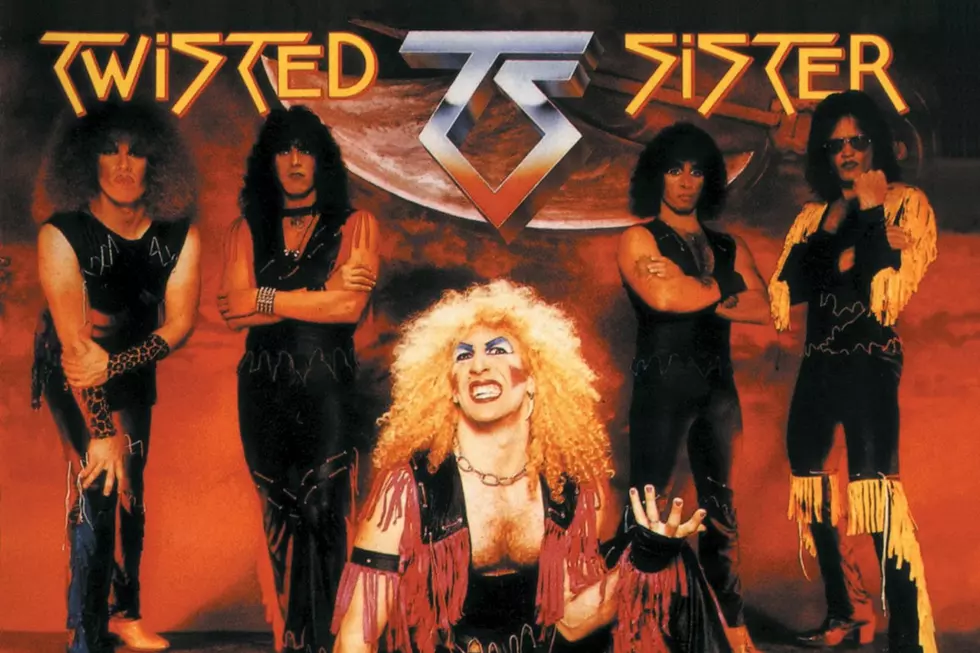
How Twisted Sister Fought Back With ‘Under the Blade’
Twisted Sister had an interesting motto which spoke to their ethos: They “looked like women, talked like men and played like motherfuckers.”
Under the Blade arrived on Sept. 18, 1982, as proof – even if they wouldn’t breakout until 1984’s Stay Hungry. Twisted Sister had already learned how to utilize everything they learned as a bar band, creating a never-say-die attitude while slugging it out in the clubs for years.
“We were turned down more times than a bedsheet and came back more times than Freddy Krueger,” guitarist Jay Jay French once told this writer. “You can not like it, but respect the hard work that went into it.”
This debut became Twisted Sister's thrashy, unvarnished mission statement to the world. While initially spawned in New Jersey, the Long Island group sounded like they could be a NWOBHM import. So it makes sense that their initial taste of attention came courtesy of Secret Records, the British independent label who signed Twisted Sister to their first record deal.
They also showed plenty of their other influences, however, giving a blues-rock tint to “Day of the Rocker,” the AC/DC-esque track that wraps up the album. The title song plays out like a suspenseful monster movie, with frontman Dee Snider describing the gory storyline piece by piece, punctuating the initial stanza by spitting out “blade” with particular emphasis and venom.
Listen to 'What You Don't Know (Sure Can Hurt You)' by Twisted Sister
He later lets out a spine grinder of a scream at the midway point that deserves its own special place in a heavy-metal hall of fame somewhere. Equally impressive is the guitar duo of French paired with Eddie “Fingers” Ojeda. They team up time and time again on fast and frenzied runs up and down the fretboard, all bolstered by the rock-solid bottom end of bassist Mark “The Animal” Mendoza and drummer A.J. Pero.
One can argue that the primitive sound of the album is actually a major asset, since it provides a note-perfect lens to appreciate Under the Blade. That extra scrappiness gives context to the rough feel of songs like the album opening “What You Don’t Know (Sure Can Hurt You)” that wouldn’t feel the same if they had a slicker production. (Unsurprisingly, the reaction was negative when Atlantic Records, Twisted Sister's eventual U.S. label, later remixed the record.)
Secret Records secured a barn in England for the band to use as their recording location, bringing in a mobile unit owned by famed British producer Mickie Most for the sessions, which were overseen in part by UFO guitarist Pete Way.
That led to some primitive, Spinal Tap-like conditions while recording: “We used bales of hay – yes, bales of hay – around A.J.’s drums and Eddie and Jay Jay’s amplifiers,” Mendoza explained during interviews for a 2011 reissue of this album.
Once they had painstakingly mapped out ideal placements, they encountered additional wrinkles. “Alright, we’ve got to break down the kit,” Pero recalled. “‘Break down the kit? Why?’ ‘Well, they’re having a barn dance tomorrow night. You can’t have this drum set in the middle of a barn dance!’”
Listen to 'Under the Blade' by Twisted Sister
During those same interviews, French said they ended up loving what the quirky process brought to the sessions – and they weren't the only ones. Motorhead’s “Fast” Eddie Clarke showed up to guest on “Tear It Loose," long before becoming Way's future bandmate in Fastway. He quickly got into the spirit, insisting on recording his guitar parts standing inside what French describes as the “haystack column” of Marshall amps. The sound reached 180 decibels according to French, who'd argued that they should record their parts outside the barn with headphones because of the volume.
Even as they were working on their first album, Snider already had his eye on the next one. There was plenty of time for him to do other things while the band members worked to lay down their parts for Under the Blade. “I sat alone in the band van or in a spare room or in my hotel room, whatever was available to me [while] developing those song ideas,” Snider wrote in his 2012 memoir.
The song that would later serve as title track to their next record, You Can’t Stop Rock ‘n’ Roll, was actually recorded during the first album sessions, then earmarked as the title track for their debut. Secret Records president Martin Hooker put the kibosh on the idea, as Snider revealed in his book: “For some reason, at that time, songs and album titles with the words ‘rock ‘n’ roll’ in them were out of vogue in the U.K.” Hooker argued that if they went with that as the title, the project would be dead in the water before fans heard a note.
In the end, the choice of title was probably irrelevant. Twisted Sister would have to wait a bit longer for widespread fame. But Snider retains a lot of reverence for where they began and the "trepidation" he felt at the time. “There are really insane scars all over my back and my body,” he told UCR in 2016. “So I remember every single bump and bruise and fall and stumble and crawl and scrape and punch.”
Snider’s songwriting – and ultimately, the trajectory for the band – also changed as a result of their shared experiences. “Songs like ‘We’re Not Gonna Take It,’ ‘I Wanna Rock,’ ‘You Can’t Stop Rock and Roll,’ were born from that,” he said during the same interview. “They were born from that refusal to die and the refusal to give up. It’s really what made the band have the success that it had.”
Final Albums: 41 of Rock's Most Memorable Farewells
Dee Snider's Spouse is One of Rock's Hottest Wives





